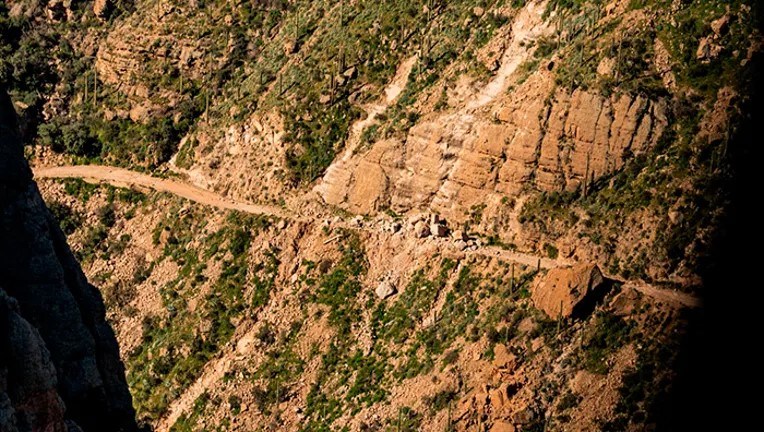In September of 2019, about an hour northeast of Phoenix near Apache Junction, a small town called Tortilla Flat experienced a 100-year flood. This flood wiped out the Apache Trail about 10 miles from Tortilla Flat, marking the fourth time this road has needed to be fully repaired. It is now 2023, and the Arizona Department of Transportation (ADOT) has published a study laying out options to fix, or not to fix, the historic highway. Previous Apache Trail repairs were accomplished due to public action, and this time, we are calling out to citizens to assemble again and make our voices heard. Let ADOT know we want the road repaired for all to enjoy.
ADOT has four renovation plans with varying degrees of repair and costs. ADOT does not understand the importance of this road and the history behind it. The Town of Tortilla Flat wants to show ADOT the passion residents have as well as the heritage, history and multi-generational stories that have taken place on this road. It is important to note advocating for history does not mean challenging ADOT, the towns simply want to show them an emotional side to this road.
Besides its historic nature, this road being closed has impacted our water system. The Salt River System feeds Apache Lake, Roosevelt, Bartlett and Canyon Lake. This system created an agricultural oasis by allowing Phoenix to develop and grow into the ninth largest metropolis in less than 100 years. Without the Apache Trail, the Valley of the Sun would not be what it is today.
In addition, the Apache Trail heavily impacts modern day issues like Arizona tourism. This road is where Arizona tourism began and continues to draw visitors from around the globe (when it is open). The Apache Trail was open to tourists before there was access to the Grand Canyon, making the Apache Trail the birthplace of Arizona tourism. The nearby communities, people and railroads on and around the Apache Trail contributed to the 5 Cs of Arizona: copper, cattle, cotton, citrus and climate.
However, because this road has not been repaired there has been a loss of tour buses and groups. There also has been a decline in international tourism to this part of Arizona. This needs to be resolved so that these tourist locations can begin to prosper again.
Tourism is not the only thing seeing negative impacts from these road closures. Local small business owners are beginning to close. The Apache Lake Marina has been owned by one local entrepreneur since the '70s. However, because of the forest fires and the road closure, they sold the marina. Had this road been opened sooner, the owner would have seen more traffic and likely been able to sustain business.
Aside from tourism and public interest, the Apache Trail being repaired also has safety concerns. The area where the Apache Trail needs to be repaired is in Maricopa County boundaries. This is critical information because if there is an emergency (medical or fire) first responders would not have access to the area without a 100-plus mile detour, taking up to three hours.
ADOT has a logical plan from a structural standpoint but does not know these stories and the devastating impacts of this closure. We want each individual who has a positive story of the Apache Trail to fill out the form found here to show ADOT the history of this road. It will help them see the urgency of this repair. Thank you, in advance, for sharing your story to help us reopen this important element of Arizona history.
Tortilla Flat is a small unincorporated community in far eastern Maricopa County, northeast of Apache Junction. It is the last surviving stagecoach stop along the Apache Trail.



